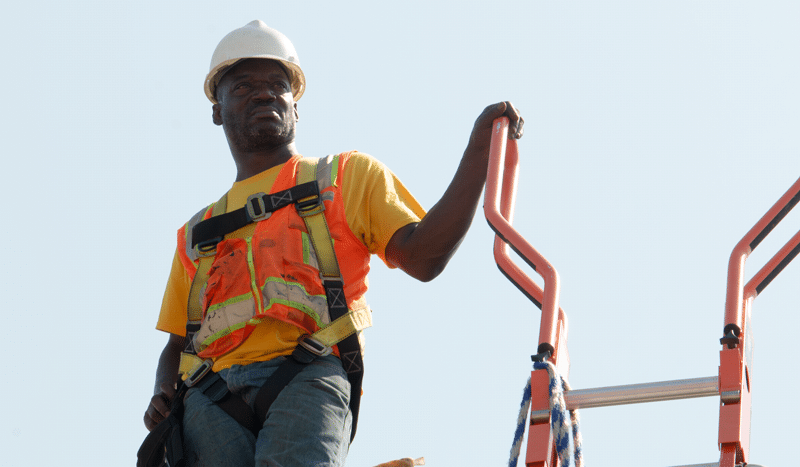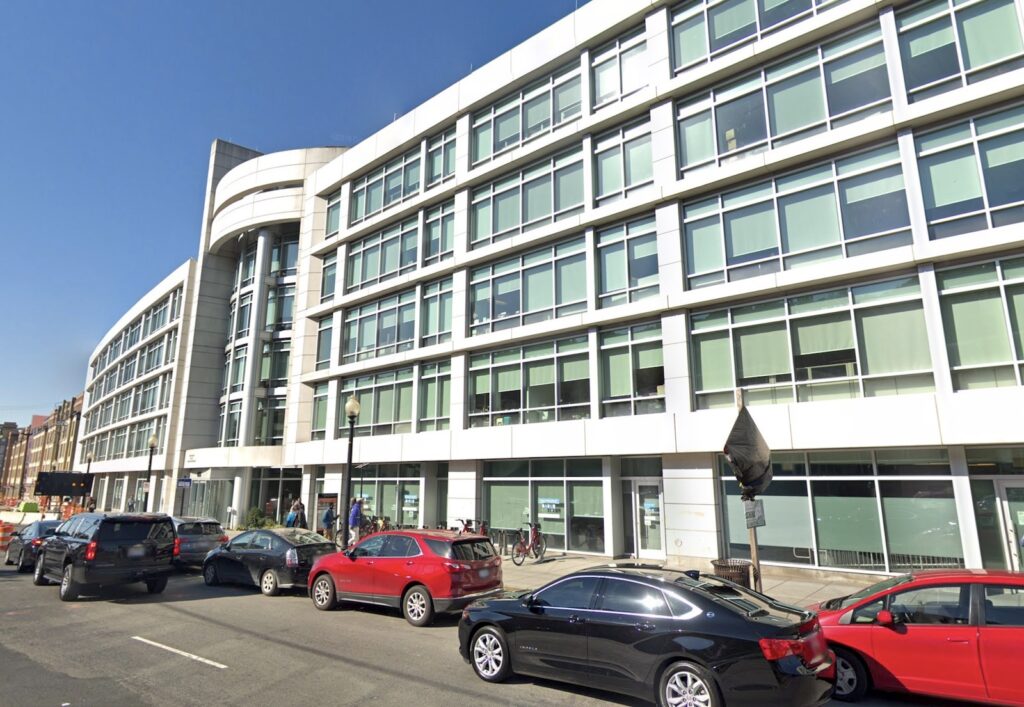Andre Roberson experienced homelessness from 2018 to mid-2019 and lived at a low-barrier shelter in D.C. Now, due to the training and mentorship he received at the D.C. Sustainability Energy Utility (DCSEU), he is a team lead solar technician and on his way to permanent housing.
“I didn’t know how to feel when it first happened, I was so grateful to have a job,” Roberson said of the help he received from DCSEU. Unemployed after losing his previous job in February 2018, he ran out of unemployment compensation in August 2018. Unable to pay his rent, and his family unable to temporarily house him, Roberson had to stay at the 801 East homeless shelter in Southeast D.C.
“It’s a reality check,” Roberson said. At the shelter, he had to hide his shoes under his pillow every night, as he and other residents slept in fear of their shoes being stolen. He moved into his sister’s house in the summer of 2020 and still lives there, searching for permanent housing.
He has reason for optimism, however, because he now works for Greenscape Environmental Services, a local green energy company that installs solar panels in neighborhoods across D.C. He was promoted to team lead within six months of working there, and he now manages seven to eight people in a team.
Roberson was connected to Greenscape through DCSEU’s Workforce Development program, a five-month externship program that trains D.C. residents to work in the green industry. Rather than an internship, the “externship” invites local D.C. companies like Greenscape, GRID Alternatives and other green energy companies to train and mentor graduates. DCSEU itself pays the externs, to compensate mentors for the time they spend training each individual.
Within the workforce program cohort that graduated in September 2020, 15 out of 19 externs received full time employment so far, even in the midst of a pandemic.
“The program was made to help individuals who are unemployed,” said Gleniss Wade, program director of the Workforce Development program, in an interview with Street Sense Media. “We have had in the same cohort people experiencing homelessness and people with graduate degrees.” She said the program has serviced several people experiencing homelessness since 2011, in addition to returning citizens and displaced workers.

Yolanda Hayden is another workforce program graduate who has experienced a loss of housing. Due to a leg injury in 2016, Hayden could not continue working as a construction project manager, losing her job and the house her company sponsored for her as well. This caused her to move between her friends’ and relatives’ houses for four years.
“I was getting to the point where I was feeling down,” Hayden said. “I was getting to the point where I was like, ‘forget it.’”
Hayden said she bounced between programs trying to find housing and employment. She attended one at Friendship Place only to realize it was for returning citizens. Regardless, Friendship Place kept recommending jobs and programs to her, until they put her in contact with Wade.
“I wanted her to be in the program so bad,” Wade said, taking an immediate liking to Hayden. “She was doing so much, she didn’t realize the impact she made on our organization through the mentor she was working with.”
After graduating from the 2020 program cohort, she is now a project manager at WDC Solar, a D.C. solar engineering, production and procurement company. She is still staying at her daughter’s house, but she feels more confident that she’ll find housing now that she has a stable job.
Externs do not need to have prior experience. All they need is proof of residency in D.C., which can include a shelter address, and an interest in working in the green industry. Wade said Roberson and Hayden had no experience with the tools used in solar installation at the start of the program.
“He said ‘I just want to be able to feed myself. I just want to get a roof over my head,’” Wade recalled Roberson mentioning.
Wade was impressed by Roberson’s drive to improve his situation. But Antonio Harrison, Roberson’s mentor and the CEO of Greenscape, said Roberson had a rocky start, not committing his full energy into the externship.
“A lot of [externs,]” Harrison said, “go from program to program to program. And they look at this as a situation where they are being used as free labor.” Roberson and Hayden have both admitted they entered the program to earn money at first. DCSEU pays externs a living wage upwards from $17/hr.
Over the course of the externship, however, Harrison said he saw Roberson grow to trust the program and take hold of the opportunities presented to him. As program director, Wade said she ensures externs learn about work etiquette and financial literacy, encourages them to keep applying for jobs, and even talks to them about their personal lives and struggles.
“If I can help them be more,” Wade said, “that would make life so much sweeter for me.”
“I really wanted to make the program proud … because I really appreciated the way [DCSEU] stood by me and made me feel like I wasn’t just some statistic,” Roberson said. “They really make you feel loved and appreciated.”
Since 2019 we’ve partnered with @DOEE_DC on its #SolarforAll program to bring the benefits of solar to more than 4,000 low- to moderate-income DC residents. We released 2 RFPs seeking developers to build enough solar to serve 2,000 more residents in 2021 https://t.co/lmESoxZBaZ
— DCSEU (@DCSEU) October 21, 2020
Theodore Trabue Jr., managing director of DCSEU, said the Workforce Development program was created in 2012 through a contract between the D.C. government and DCSEU to improve energy efficiency in the city. As part of the contract, DCSEU needed to hire a number of local residents so that they could “be a part of this new economy.”
As someone who had worked in workforce development for a time, Trabue had a vested interest in ensuring his externs could get jobs.
“I really wanted to prove the naysayers wrong, those people who say District residents aren’t employable, because they aren’t trained,” Trabue said.
“Being a D.C. resident, I think it’s important to give other D.C. residents the chance to learn,” Harrison said. As the CEO of a Black-owned green energy firm, Harrison directly ties the employability of D.C. residents to race.
“Believe it or not, there are not a lot of African American companies that also have a lot of African American employees working in the field,” Harrison said. “And D.C. is not used to seeing that, even though D.C. is predominantly African American.” D.C. was a majority-Black district from the 1950s to 2011.
Roberson now often works on the roofs of buildings across the District, including Howard University and low-income, majority-Black neighborhoods. While in a neighborhood in Southeast D.C., Harrison told Roberson that he and his team were probably the first workers who look like the neighbors in the neighborhood.
“You know what it’s like, seeing people of color see other people of color doing work in their neighborhood?” Roberson said. “I had a chance to feel like I was making a difference.”








